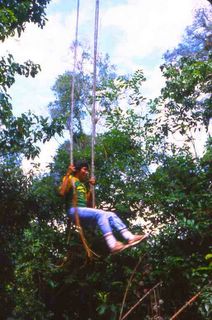
Orlando was special. Of the staff at the Amazon Safari Camp, upriver from Iquitos, Peru, Orlando (above), was the one whose job description was to interact with the tourists. He spoke flawless English, was gracious and sociable, had a quick wit and knew everything about the great river and its surrounding jungle world.
He dressed like a city kid in jeans, football jerseys and running shoes, and he flashed a wide, white grin that charmed and disarmed. He took us along the Rio Momon, an Amazon tributary, in a sputtering wooden boat splashed with peeling turquoise paint and covered by a canopy of dried, gray tree fronds. We visited the villages of the Yagua and the Bora and watched young brown boys standing on the prows of shallow dugouts spear fish from the muddy water. We looked for snakes in the trees and took in the tumbledown hubbub of Iquitos, a shabby, backwater river port that had long ago lost the luster of its boom days as a Dutch-controlled center of rubber production. Orlando took us on daytime tramps into the rainforest to scout plants and animals and to swing on vines, and he took us on nighttime tramps to gaze in awe at the Southern Cross.
Orlando loved his rainforest world, and his relationship with it was a deep, reverent drink. A communion. But he wanted very much to leave it.
He wanted to come to the United States. In each new group of visitors to the river camp, Orlando looked for a connection, a contact, a sponsor, a benefactor, a bride. A ticket out. He romanced the single ladies and displayed his intelligence and business acumen to the men. Our group numbered about a dozen, and he focused his emigration efforts on a lovely wisp named Chris, from Denver, traveling with her mother and brother. When they thought no one was looking, Orlando and Chris would scramble up a muddy bank and disappear into the trees. Not, we presumed, to scout plants and animals or to swing on vines.
When our visit was over and Orlando deposited us at the ramshackle Iquitos docks from where we’d make our way to the airport for our flight to Lima, Chris smiled the smile of a free-spirited woman who’d had a good time on vacation, and Orlando smiled the sad smile of one who’s come to know and expect rejection. We all hugged Orlando and shook this beautiful man’s hand, and we left hoping he’d find a way to display his talents and gifts on a stage larger than the banks of the Amazon. We left him reluctantly.
A few years later, as Mike and I were painting the walls of our house, the phone rang. I answered, and the caller, a man, asked for Mike. “Tell him I’m busy,” Mike called from the living room. He was up to his elbows in paint. “Get the number, and I’ll call him back.” I asked the caller for his name and number, and the voice said, “It’s Orlando. I’m in Chelsea.”
He’d made it out of the Peruvian jungle. We talked for a minute. Orlando had married an American and lived in Chelsea, a blue collar suburb north of Boston. He was a half-hour drive from us. That he’d saved our number all these years stunned me (but shouldn’t have). In the chaos of dropcloths and paint cans and furniture piled in the middles of rooms, I found a slip of paper, wrote down Orlando’s number and told him that Mike would call him back and that we couldn’t wait to see him.
Painting done for the day, we decided to call Orlando. Invite him and his new wife over to see slides from our Peruvian adventure. (“Yes! That’s your husband swinging from vines!”) Welcome him to America. Embrace him with the same warmth and graciousness with which he’d embraced us when we were in his country.
We looked for the slip of paper I’d written his number on, but we couldn’t find it. We looked for days. We didn’t know Orlando’s last name, so we couldn’t call information for the number. We’d sit, with a sick feeling, knowing he was waiting for our call, and we’d get up and look again.
We never found the number. Whenever we think of Orlando now, the memories are bittersweet. We met a good human being who reached out to us, and he thinks we turned away, left him hanging.
